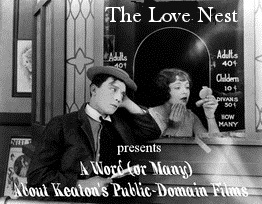
Dear reader, I beg of you: Read the following very carefully, if you do not want to get into huge legal trouble on YouTube or elsewhere on the Internet. (You are listening to the voice of experience on this one.) (Also, from here on in, "PD" = "public domain" in this discussion.)
"Public domain," in a nutshell, is a term for work such as published books, theatrically released movies, etc., whose copyright has lapsed. If you've ever wondered why you could purchase a certain old movie or an episode of "The Beverly Hillbillies" for cheap at a dollar store, it's because some fool forgot to renew the copyright on that item, and now some lip-smacking huckster is printing cheapo copies of that work to make a quick buck off them.
Certain Keaton buffs will tell you that you can do whatever you want with only Keaton's public-domain work -- but they neglect to tell you exactly which of Keaton's movies are PD. But in this case, my authority is Scott MacGillivray, corresponding secretary for Sons of the Desert (a/k/a The Int'l Laurel & Hardy Appreciation Society) -- and as he deals regularly in such matters, he ought to know.
According to Scott, all of Keaton's silent short subjects for Metro and First National -- that is to say, his entire short-subject output from 1920 to 1923 -- is PD. So are the three feature films that Keaton made for United Artists: The General, College, and Steamboat Bill Jr. Lastly, two of Keaton's MGM talkies -- Parlor, Bedroom and Bath and Speak Easily -- are PD. However...
(Attention, kiddies...NOW is where you definitely need to start paying attention!! Do I have your attention? Good!)
However... Scott (and I) want to make it very clear that, of the movies referenced two paragraphs ago, they must be original-release prints, in their original form, in order to be considered PD. Just because you might be viewing Keaton's short subject One Week (released in 1920) or some other pre-1924 Keaton film on-line, don't assume it's the public-domain version. And this is where things start getting very, very sticky.
All of Keaton's silent films have been remastered and restored, with newly added musical soundtracks. Those "new" versions of Keaton's films are indeed copyrighted. Unfortunately, many sites (particularly The Internet Archive) are happy to pass off the copyrighted versions of these films as "public domain," which they are not.
Furthermore, a cursory glance on YouTube will yield many finds of Keaton films such as Sherlock Jr. and Our Hospitality -- feature films whose original versions are still under copyright. The people who have posted these movies are breaking the law -- whether intentionally or not, and whether they realize it or not -- and eventually it will catch up to them.
(I saw one YouTube channel that proudly sported Keaton's 1929 MGM silent film Spite Marriage for an entire year. It took a while, but YouTube was finally informed of the offender and has since suspended his account.)
Here, via a Web newsgroup memo dated 2002, is a comment from Jessica Rosner of Kino International. (Kino is the company primarily responsible for the superlative restorations of Keaton's early silent films, among other fine work.) This is Ms. Rosner's comment on whether anyone can post and/or broadcast a non-PD Keaton film, or a copyrighted, restored version of a Keaton film:
"NO! You can never broadcast a film without permission and (presumably) a fee to the rights holder. Also for the record, classroom use has nothing to do with either 'fair use' or 'non-theatrical.' You can show it in a class because of the 'face to face' teaching exemption. Fair use applies to the circumstances in which you can use a small part of a copyrighted work (a long story), and non-theatrical merely means a noncommercial screening but all non-theatrical use requires rights and payment."
Got that? Of course you do.
If you wonder whether or not a particular Keaton posting is really public domain, here are at least a few signs. The copyrighted versions look very sharp and clear, and they have closing credits of "Music by Robert Israel" and "Copyright 1995" or even more recent copyright dates. Many of the "public domains" sport an opening credit (added by the late Raymond Rohauer) of "Buster Keaton Productions Present," as well as the incorrect credit "Written and Directed by Buster Keaton" (nearly all of Keaton's silent shorts were co-written and -directed by Eddie Cline and were originally credited as such). Also, the public domains are not at all restored, usually looking very scratchy or muddy. Some of the public domains are truly silent films, with no soundtracks whatsoever.
If you do find a public domain Keaton film, you are free to post or screen that version anywhere without penalty. But be sure that it's PD. I have posted several PD Keaton films at YouTube, with soundtracks that I've added from some of my favorite musical artists (soundtracks that have been approved by YouTube, I might add). You can click here to view them.
Related links:
Subverted PD List An explanation of why such items as Keaton's Sherlock Jr. and Walt Disney's early Mickey Mouse cartoons (!!) should be public-domain but are not.Read and sign the Reclaim the Public Domain Petition
Return to: